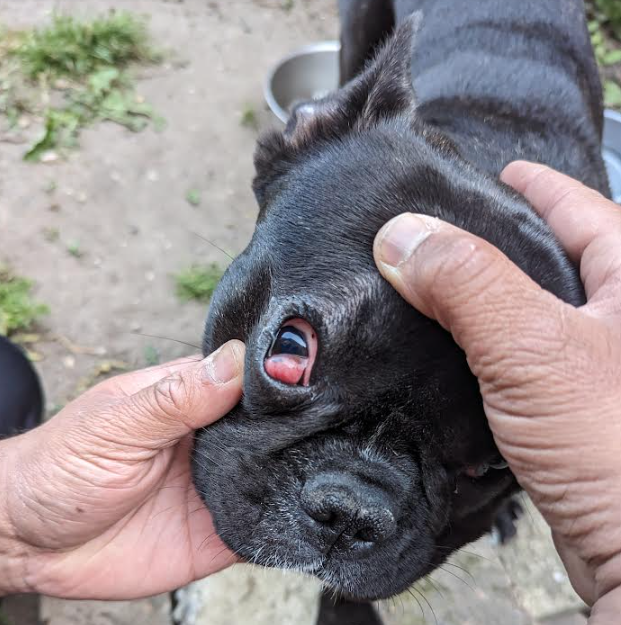
Buster - who developed cherry eye when he was a puppy
RSPCA Trials Vet Voucher Scheme To Support Pet-owners In Financial Difficulty
A nationwide veterinary care assistance scheme to support pet owners suffering financial difficulty is being trialled by the RSPCA
The animal welfare charity is issuing vouchers - up to the value of £250 - to pet-owners who need financial assistance towards their animals' veterinary treatment costs.
Vanessa Howie, head vet of companion animals at the RSPCA, said: “We are so grateful for the support from vets who are seeing pet-owners with one of our vouchers. There are many struggling pet owners at the moment who are facing difficult choices due to competing demands to provide for themselves, their families and their pets through the cost of living crisis.
“The RSPCA understands the importance and benefits of keeping animals with their owners, even when people have fallen on hard times, as keeping animals and their owners together during difficult times benefits both the owners and animals’ wellbeing. By supporting owners to access veterinary care we can ensure that the needs of the animals are met and their health and welfare is maintained.”
The paper vouchers are issued by the RSPCA’s frontline officers, or via food bank referrals, to owners identified as being in a situation of financial distress and who have an animal in need of veterinary treatment which they are unable to fund.
The voucher entitles the owner to a contribution from the RSPCA up to the value of £250. Where treatment costs are more than the voucher value, the owner will be expected to pay the difference. In some instances a local RSPCA branch or other charity may also be contributing towards the cost of treatment.
Vanessa added: “We are analysing the data captured from the vouchers that have been issued so far, to understand more about the best ways of helping animals and their owners through the cost of living crisis.We really want to develop the voucher scheme to create a good user experience for vets and owners alike.”
Vouchers can be used towards:
- Preventative treatment such as flea treatment or nail clipping
- Neutering Acute and chronic medical or surgical interventions, including treatment for ongoing medical conditions. When providing treatment a pragmatic approach should be used and it should meet the following criteria:
- Treatment must provide a good prognosis and be sustainable for the owner
- Surgery must be curative - Euthanasia
Practices which receive a voucher will, in most instances, have been contacted beforehand by an RSPCA inspector to arrange an appointment for the owner to bring their animal to see the vet. During this initial contact they will have determined the amount of money they should issue the voucher for, to help towards the cost of treatment.
After receiving a veterinary care assistance voucher the practice must complete a section on the voucher outlining:
- the date the animal was seen
- the name and address of the vet practice
- a practice representative signature and date
The voucher and corresponding invoice - addressed to the RSPCA - must then be emailed to the RSPCA for payment. Claims must be submitted within 30 days of treatment and must include the reference number of the voucher.
Vanessa said: “We have already seen success with these vouchers which have seen animals treated for conditions and for which their owners have been incredibly grateful.”
One example is a dog named Buster - who developed cherry eye when he was a puppy - and as a result the condition was excluded from any future insurance policies. Buster’s owner was on low income and was registered at a local RSPCA branch clinic.
Unfortunately, the RSPCA clinic was unable to provide the corrective surgery required and instead advised that Buster should be referred to another private vet practice for surgery. The cost of the corrective treatment was quoted at approximately £1,400, which the owner couldn’t afford.
An RSPCA officer was able to negotiate the cost of Buster’s treatment with a local vet and it was arranged for Buster to go to the practice with an RSPCA veterinary care assistance voucher.
“With the voucher and a donation from the RSPCA branch, Buster was able to have surgery with his owner covering the remaining cost of treatment,” said Vanessa.
“There were no other welfare issues for Buster at home and he was able to stay with his owner. The surgery was successful and Buster is doing very well. His owner is extremely appreciative of everyone's help and immensely happy to still be with Buster.”
More from RSPCA
- Vet warns cat owners not to buy lilies this Mother’s Day
- More pet owners and animals in need to be helped by exciting charity partnership
- New avian flu guidance for wildlife rescue and rehab centre vets
- Seen a baby bird outside its nest? Check RSPCA advice online first
- Vets play critical role in helping RSPCA Cancel Out Cruelty

 2 years ago
2 years ago  8718 views
8718 views

 12 hours ago
12 hours ago